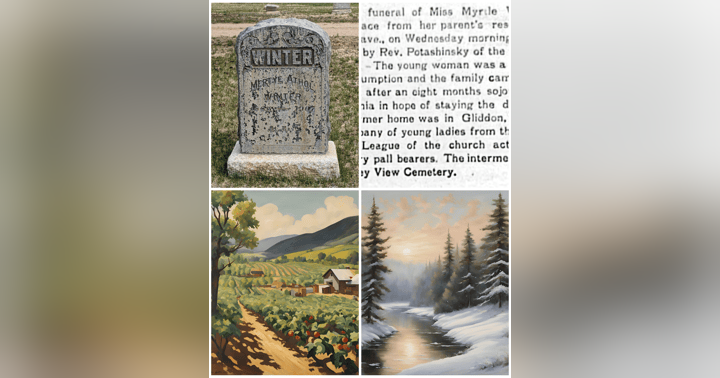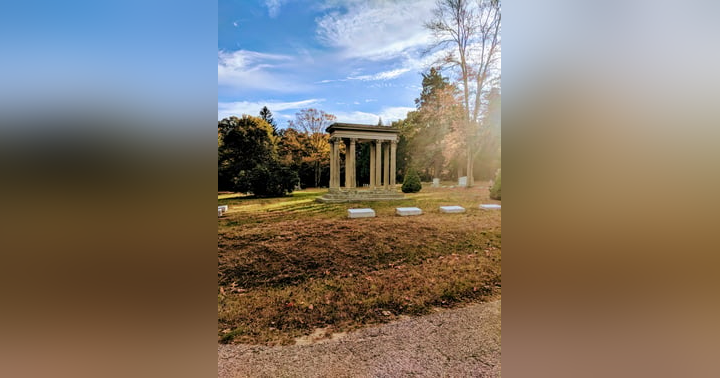From Tunkhannock to the Rockies: The Untold Story of Thomas Hoadley

Sometimes a very simple gravestone will catch your eye and set you wondering about the person whom it memorializes. In this instance, we have a small rounded marble stone with tassels carved on either side and the three chain links at the top with the letters F,L,T (Friendship, Love, Truth) inside the link, one of the many symbols used by the International Order of Odd Fellows. The inscription beneath the chain links reads, “T.I. Hoadley
Of Tunkhannock, PA. - Born Apr. 6, 1839 Died Oct. 18, 1879.” There is no family buried nearby and no indication of what brought him from Pennsylvania into the high altitude of the Rocky Mountains in Leadville, Colorado. However, after playing detective, we have a good idea of this gentleman's story.
The initials T.I. stand for Thomas Ide. Thomas Ide Hoadley was born to Miles and Sally Hoadley on April 6, 1839 in Cannan, Pennsylvania. The 1860 census shows that at age 21 he was a resident of Tunkhannock, Pennsylvania (located just under 50 miles from the town where he was born) and he was drafted into the Union Army on July 1, 1863 at the age of 24.
The town of Tunkhannock, incorporated in 1842, is situated along the banks of the Susquehanna River and is the county seat of Wyoming County, Pennsylvania. Agriculture and lumber were the primary way of life in the early days. Being situated along the water, the river also helped to support the economy by allowing transportation through its waters for both people and goods. By 1869, the railroad had also come to town allowing transportation over land and water making Tunkhannock a vital hub for trade and commerce.
Thomas Hoadly was not one of the town's wealthiest citizens, but that didn't keep him from being involved in town business and politics. On December 27, 1865 Thomas married local school teacher Mary Virginia “Jennie” Mitchell. Over the course of their marriage the couple would have five children: Lizzie, Willie, Sara, May, and Ruth. Census records list Thomas's profession as “Laboror” and we know from various newspaper articles that he did a lot of painting and carpentry throughout the town. He was also hired to man a barge hauling hay and other goods up the river for delivery. For a time the family lived in the Bridge Toll House and Thomas was the official “toll gatherer” until 1874 when the family relocated to a house on Putnam Street.
Thomas served on the town council and was appointed to the grand jury of 1876. He was also a very involved member of the I.O.O.F (International Order of Odd Fellows). He was reported to be a staunch Republican, but held in high esteem by the majority of the Democrats in town. In May 1879 he resigned from his position as Street Commissioner in order to travel to Leadville, Colorado to take a position offered by “Messers Henry & Whipple at $3.50 per day.” Exactly what the job was, was not made clear in the article, but Leadville, Colorado founded in 1877, is a historic mining town situated at high elevation in the Rocky Mountains, known for its rich mining heritage during the Colorado Silver Boom. A day’s labor in those mines paid anywhere from $2 for surface work up to $3.50 for underground mining. Hoadley traveled to Colorado by train and was most likely situated in Leadville no later than June.
Sadly, Thomas Hoadley was only in Colorado for a few short months before he passed away from Typhus fever on October 18, 1879. His wife, Jennie and their five children, had stayed behind in Pennsylvania. An article printed in the Tunkhannock Republican told his hometown of his passing. “Rites of Respect: The following, clipped from a Leadville paper, has been handed us for republication, to show to the friends of the late Mr. Hoadley that though he died a stranger in a strange land he was not obscurely buried.
"At ten o'clock this morning Chloride Lodge No. 31, I. 0. 0. F., turned out in a body to attend the funeral of Brother Thomas I. Hoadley, recently deceased. A long cortege followed the remains to the cemetery, where, with the solemn and impressive services of the order, the coffin was consigned to its last resting place."
Another notice in a later edition of the same paper mentions, “Mr. Thomas Hoadley was before his death a prominent member of the Odd Fellows' Lodge here. The Lodge kindly remembered his widow one day last week by providing her with a car load of coal.”
However, that is not quite the end of Thomas Hoadley’s story. Appearing in the Wyoming Democrat on October 31, 1884 was a sensational headline…
Judge Ingham’s Last Card!
*************************************************
Another of his Campaign Lies NAILED!
*************************************************
The Hoadley Circular!
*************************************************
Kept Until the Last Moment with a View of Palming it Off on an Unsuspecting Public when too Late for Contradiction!!
*************************************************
The Dasterdly Work Discovered by Mr. Sittser’s Friends by Accident!!!
*************************************************
A Sad Spectacle Indeed for a Judge of Our Courts!!!!!
The gist of the story is this: Judge Ingham (Republican) was running for reelection against John A. Sittser (Democrat). Apparently, Judge Ingram's staff had issued a lawsuit on behalf of the widow of Thomas Hoardley against John Sittser claiming that she was owed $134 on her husband's behalf for a job he had done for Mr. Sittser 13 years before. However, Mr. Sittser disputed the claim stating that Thomas Hoardley was paid at the time of his services. He had been hauling hay up river for delivery. Unfortunately, he allowed the hay to get wet and some of it was damaged. $134 was deducted from the price of the delivery to compensate for the damages. Apparently, Thomas Hoadley, John Sittser and others involved in the transaction were satisfied with the arrangement. It seems that Jennie Hoadley agreed to this lawsuit in order to help make John Sittser look like a man who did not keep his promises and did not deal fairly in business. This article was printed in Sitter's defense that the business had concluded appropriately and that it was strange that such a lawsuit would be brought about so many years after the event and after the person who conducted the business was deceased. A circular detailing the alleged indiscretion was printed by the judge’s staff and issued throughout the town. Apparently, when it comes to politics, some things never change.















